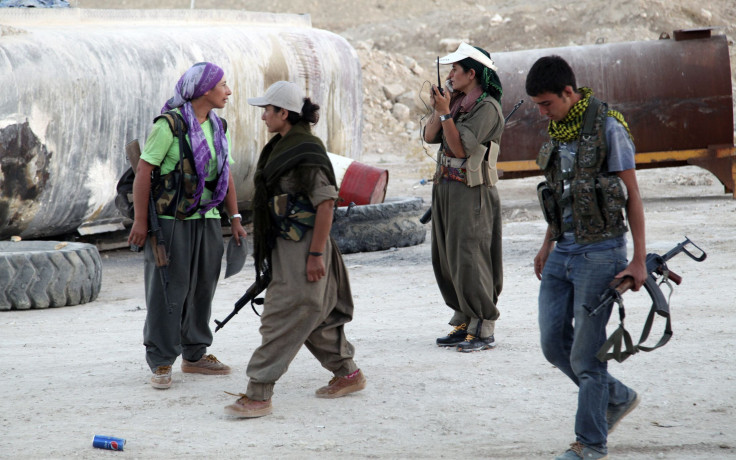US Weighs Options As Combat Troops Ruled Out In Iraq

As the U.S. airstrikes against ISIS militants in Northern Iraq that began Friday continue into a second week, Pentagon officials have admitted that the air offensive has been ineffective at stopping the insurgency and the continuing humanitarian crisis in the region
In response to the increasingly desperate humanitarian situation, U.S. Secretary of State John Kerry said in a press conference on Tuesday that U.S. combat troops will not be reintroduced to Iraq, raising questions about what exactly the U.S. and its allies could do to stem the spate of violence and bloodshed that has gripped the region in recent weeks.
U.S. Navy and Air Force jets have hit positions and equipment of the ISIS militia in Iraqi Kurdistan, helping support the peshmerga, the Kurdish fighters who have held back ISIS for weeks. “Kurdistan has plenty of combat power, they don’t need U.S. boots on the ground, they need support,” said James Carafano, vice president for Foreign and Defense Policy Studies at the Heritage Foundation. “They need ammunition, heavy weapons and continued air support, then they can defend themselves just fine.”
President Barack Obama said Tuesday that he was considering sending 75 more military advisers to Iraq to join the 250 already there. Australia and the United Kingdom have both made announcements that they will continue their humanitarian missions in the north of the country, adding that neither U.S. ally has been asked to officially contribute to any potential ground mission. However, Australia has not ruled out sending ground troops if asked, and a U.K. government spokesperson said that troops could be used on the ground for purely humanitarian purposes, namely creating a safe passage out of the region for Iraqi Kurds.
U.S. airstrikes began in Northern Iraq after ISIS fighters seized the town of Sinjar, forcing between 20,000 to 30,0000 Yazidis to flee to the summit of Mount Sinjar, as Kurdish forces on the ground attempt to repel the militants, who have already killed hundreds of Kurds, according to a U.N. spokesperson.
“I in no way want to suggest that we have effectively contained, or that we are somehow breaking the momentum of [the Islamic State of Iraq and the Levant],” said Army Lt. Gen. William Mayville, the director of operations, or “J-3” for the Joint Staff, told reporters Monday.
When pressed on the issue of U.S. ground troops going into Iraq at the annual Ausmin conference in Australia, Kerry said that the United States would “fully support a new and inclusive Iraqi government” but gave a clear indication that the United States did not want to place troops in the country. “Nobody, I think, is looking forwards to a return to the road that we’ve travelled,” Kerry said, referencing the eight year war in Iraq that ended in 2011.
Instead, Kerry’s preference was to support Iraq with either training, equipment or assistance to quell the Islamist terror threat. However, Carafano doesn’t see a quick fix to the issues that Iraq is facing now and says if it comes to the point where boots on the ground is the only option, it should not be U.S. troops, but a mixture of Iraqi forces with Kurdish fighters and continued support from the United States. “We had a perfect model in Afghanistan with the northern tribes,” Carafano said. “They were able to build on U.S. military advances just fine. That model can work here, but it’s the politics of that that is troubling.”
Until now Kurds have largely been left to fight the militants alone due to political infighting in Baghdad, which has left the country without strong leadership or the ability to deal with what was happening in the north. Now with Prime Minister Haider al-Abadi in charge, Kerry has asked him to form a cabinet “as swiftly as possible” to deal with the continued threat in Kurdistan.
But Carafano is not sure that simply having a settled government will preserve the long-term future of Iraq. “Even if the Kurds can keep fighting and Iraq gets a more involved government, which uses the military to drive ISIS from the country, you’re just back at square one,” he said. “If you [the United States] walk away again it could very well happen again -- you have to stay until the institutions are self-supporting and that just takes time.”
© Copyright IBTimes 2024. All rights reserved.












